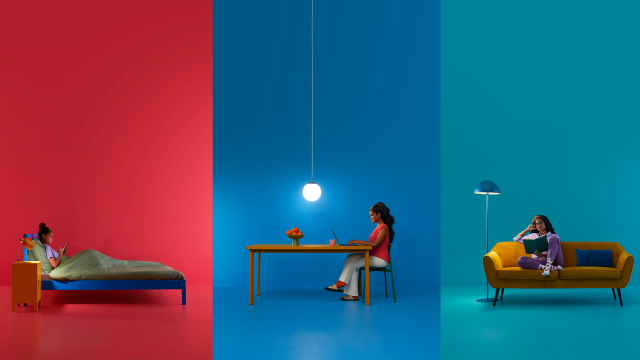Having the lights turn on as soon as you walk into a room is exactly how we envisioned the smart home. But it hasn’t been easy to configure unless you program a routine or a motion sensor around the house to trigger the lights. Signify, the makers behind WiZ and the Philips Hue smart bulbs, have figured out a way to turn lights on without this tedious setup.
The feature is called SpaceSense, and it’s coming as part of WiZ’s next software release. SpaceSense uses wifi sensing technology to detect changes in signal strength based on the mass moving through rooms. It works similarly to a security device I reviewed last year, called Hex Home Security, which determines movement based on activity within range. Since it doesn’t use a camera, SpaceSense does not recognise faces or locations, and there’s no cloud service necessary to intercept the data.
WiZ’s wifi sensing capabilities are built directly into the light bulbs, and SpaceSense takes advantage of any existing wifi signals in a room. Like the Hex security system, it relies on at least two compatible bulbs within range to set up a digital fence of sorts. “By measuring the small deviations in signal strength caused by those disturbances, the WiZ lights can determine if there is an object moving in the room,” explains WiZ’s press release. The sensor technology is omnidirectional and doesn’t require a line of sight during installation. Folks with pets can also adjust the sensitivity of SpaceSense to prevent accidental triggers.
SpaceSense is available for most of WiZ’s products introduced after Sept. 2021. Any Connected by WiZ products, including Philips Smart LED and other third parties within the WiZ network, can take advantage of the tech. However, it will require updating to the new WiZ app V2, launching in late September, as it was designed specifically for this feature. The app has also undergone an overhaul to streamline the interface.
SpaceSense will not work with Philips Hue, since it uses a different connection mechanism than WiZ. But the ability is exciting nonetheless, considering the brand’s affordability and commitment to supporting the upcoming Matter standard. A two-pack of the connected A19 bulbs is around $US22 ($31) at most retailers. That’s all you need to spend to take advantage of SpaceSense.
